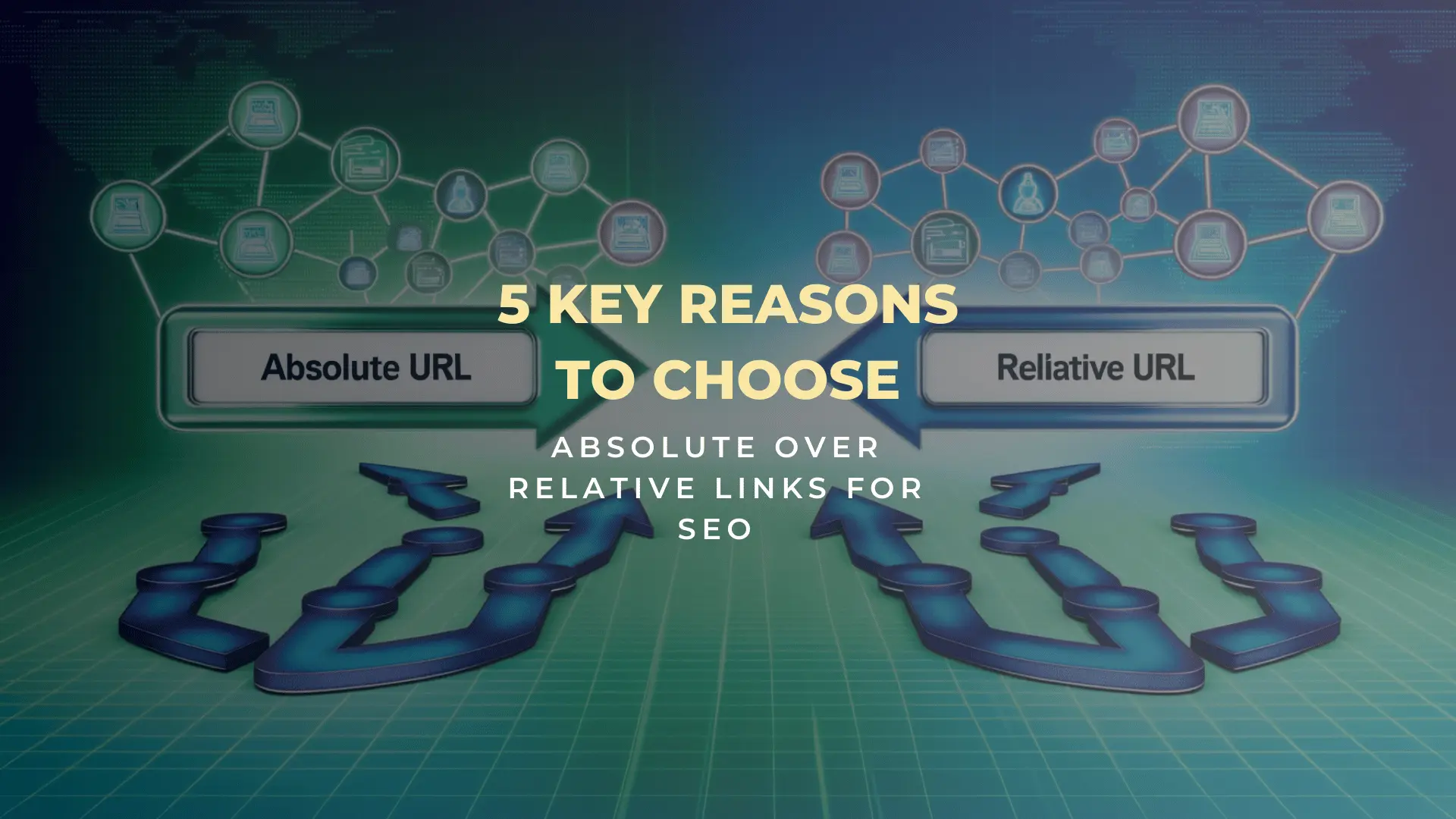5 Key Reasons to Choose Absolute URLs Over Relative Links for SEO
October 29, 2024
When it comes to optimizing your website for search engines, the choice between absolute and relative URLs can have significant implications. While relative URLs offer some benefits, such as easier coding and slightly faster load times, the advantages of using absolute URLs far outweigh these in the context of SEO. Here are five key reasons why you should choose absolute over relative links for your website.

Table of Contents
1. Prevents Duplicate Content Issues
One of the most critical reasons to use absolute URLs is to avoid duplicate content issues. When you use relative URLs, search engines like Google can crawl and index multiple versions of your website, leading to duplicate content problems. For instance, if your site has multiple versions (e.g., http://www.example.com, http://example.com, https://www.example.com, https://example.com), relative URLs can cause Google to treat each version as a separate entity, potentially leading to a decrease in your site’s overall SEO performance.
For more insights on how different SEO strategies and tools can impact your site, our article on Top 3 Essential Automations for SEO and Digital Marketing Success may also offer valuable guidance.
2. Foils Scrapers and Protects Your Content
Scrapers often target websites with relative URLs because it is easier for them to scrape and replicate the entire site on a new domain. Relative URLs make it simple for scrapers to copy your content without having to re-code the links, which can lead to copyright issues and damage to your brand.
Using absolute URLs makes it much harder for scrapers to copy your site. Since absolute URLs include the full domain name and path, scrapers would have to manually re-code thousands of links, making the process tedious and less likely to occur.
3. Improves Crawling Efficiency
Google’s crawlers follow internal links to index your site’s pages. If your site uses relative URLs, it can complicate the crawling process, especially if your site has a complex structure or multiple domains. Absolute URLs help Google’s crawlers navigate your site more efficiently, ensuring that all pages are crawled and indexed correctly. This can lead to better crawl rates and more frequent indexing, which is crucial for maintaining and improving your SEO.
4. Enhances User Experience and Reduces Errors
Absolute URLs reduce the risk of broken links and errors that can arise from relative URLs. When you use relative URLs, any changes in your site’s structure or domain can lead to broken links, which can frustrate users and negatively impact your site’s usability. Absolute URLs ensure that links remain intact even if the site’s structure changes, providing a smoother user experience and reducing the likelihood of 404 errors.
Do not miss out on understanding Key Features of a User-Friendly Website Design That Retain Visitors, as enhancing user experience is vital for retaining your audience.
5. Simplifies Migration and Staging
While relative URLs can make it easier to move a site between staging and production environments, absolute URLs offer a more robust solution when it comes to ensuring consistency across different environments. When you use absolute URLs, you don’t have to worry about links breaking during migrations or when switching between different domains. This consistency is particularly important if you are using a content management system (CMS) that has a staging environment with its own unique domain.
For more detailed strategies on managing your website effectively, you may want to explore 7 Key Steps to Choose the Perfect CMS for Your Website.
Conclusion
Choosing between absolute and relative URLs is not just a matter of coding convenience; it has significant implications for your website’s SEO performance. By using absolute URLs, you can prevent duplicate content issues, protect your content from scrapers, improve crawling efficiency, enhance user experience, and simplify site migrations.
If you’re struggling to optimize your website for better SEO performance or need help in transitioning to absolute URLs, consider leveraging AI-driven optimization services. Our agency specializes in using advanced AI tools to streamline your SEO strategy, ensuring your website is optimized for maximum visibility and performance. For more ideas on using AI in your marketing efforts, check out our post on How AI is Revolutionizing Marketing in 2024.
Take the Next Step
- Optimize Your Site Today: Discover how our AI-driven optimization services can help you improve your website’s SEO and user experience. Learn More about AI-Driven SEO Strategies
- Get a SEO Audit: Understand the current state of your website’s SEO and identify areas for improvement with our audit. Get Your Audit
- Contact Us: Have questions or need personalized advice? Our team is here to help. Contact Us
By choosing absolute URLs and leveraging the power of AI in your SEO strategy, you can ensure your website is well-optimized, secure, and ready to attract more traffic and conversions.
FAQ
What’s the main difference between absolute and relative URLs?
An absolute URL includes the complete web address (e.g., https://www.example.com/page), while a relative URL only includes the path after the domain (e.g., /page).
Will switching to absolute URLs affect my site’s loading speed?
While absolute URLs are slightly larger in size, the impact on loading speed is negligible for most modern websites and is outweighed by the SEO benefits.
Do I need to convert all my existing relative URLs to absolute URLs at once?
No, you can implement the change gradually, starting with your most important pages first. However, having a consistent approach across your site is recommended for best results.
How do absolute URLs help with website migrations?
Absolute URLs make it easier to track and update links during migrations, reducing the risk of broken links and ensuring all references to your content remain intact.
Are there any cases where relative URLs might be preferable?
Relative URLs can be useful in development environments or for local testing. However, for live, public-facing websites, absolute URLs are generally the better choice for SEO.
How can I check if my website is using absolute or relative URLs?
You can view your page source code or use SEO crawling tools to analyze your internal links. Most modern content management systems also provide options to display your link structure.

